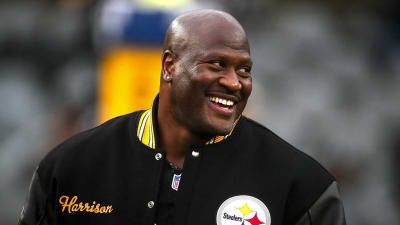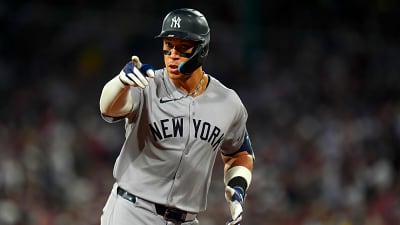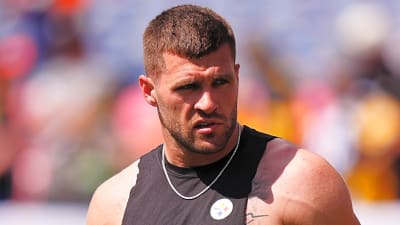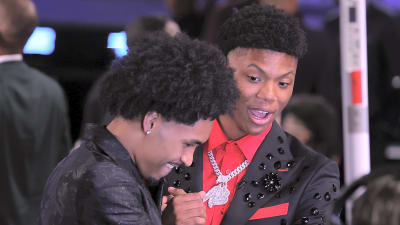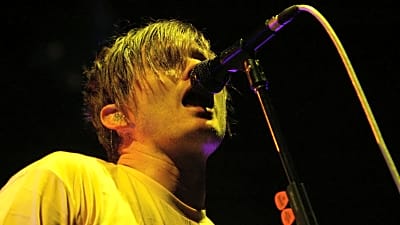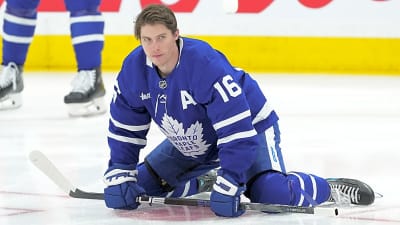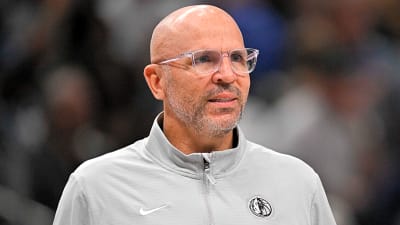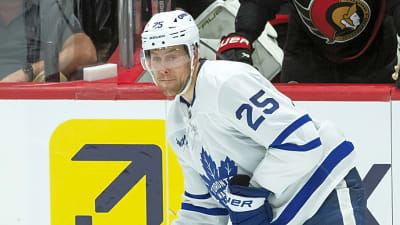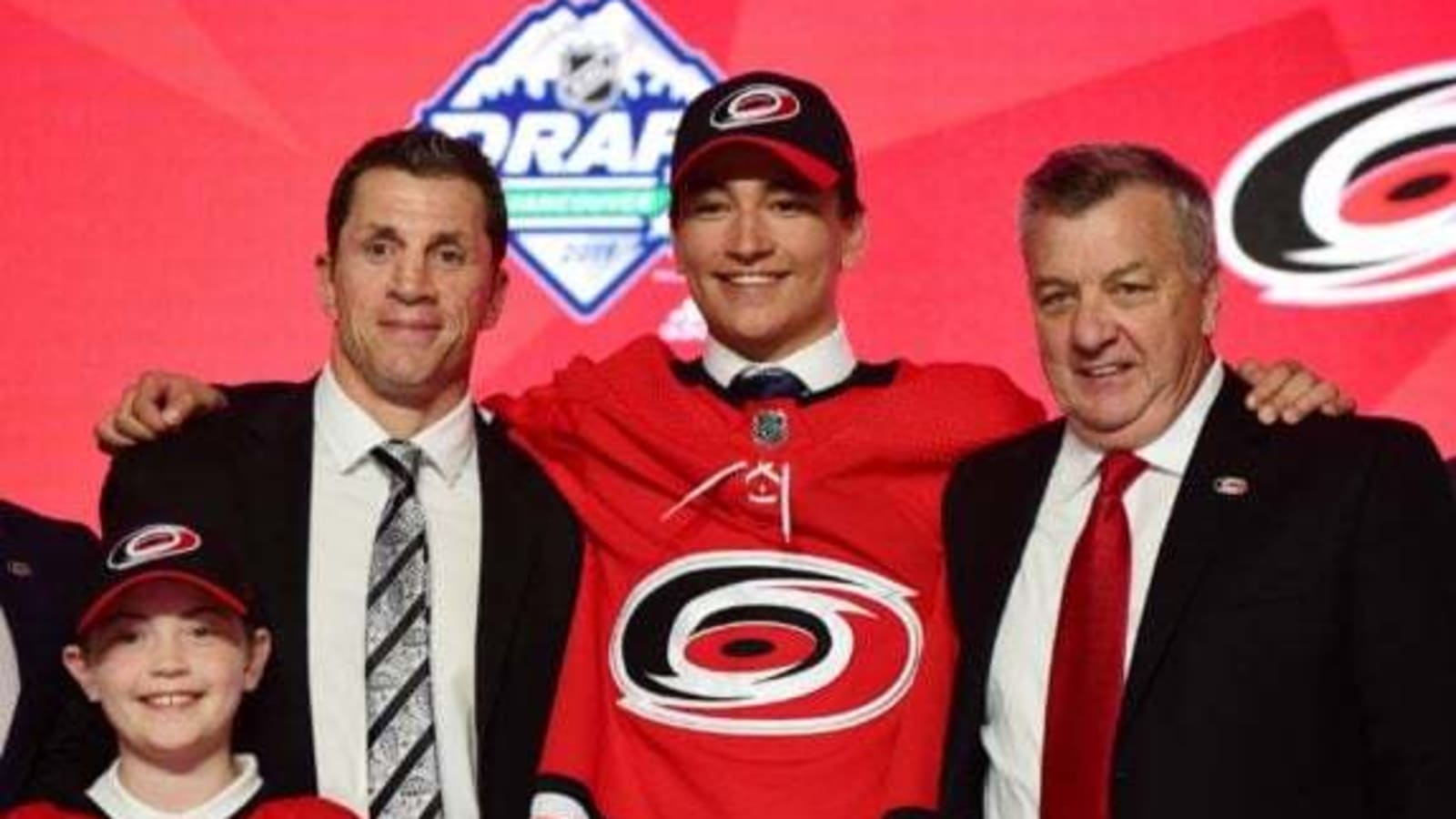
The Carolina Hurricanes are heading into a pivotal offseason in their Stanley Cup window with a grand total of zero restricted free agents (RFAs) on their main roster. While they do have eight of them in the system, their crop of RFAs are considered more depth pieces and potential futures rather than guys who are in need of an immediate payday — which bodes well for the team’s ability to spend on the open market.
While there aren’t really any cornerstone players with RFA status this summer, the Hurricanes will have some promising young players due for new contracts who they’ll hope to keep in the organization. Let’s have a look at these players, their development and future potential, as well as the likelihood of each individual to stay or go heading into the 2025-26 season.
Forwards
Ryan Suzuki
A player who’s had a whirlwind of a ride since his arrival into the organization as a first-round pick back in 2019, I feel like Ryan Suzuki’s progress has him on the cusp of an NHL opportunity. The question is — will that opportunity come in Carolina? He had a superb season with the American Hockey League’s (AHL) Chicago Wolves, scoring 12 goals and 59 points across 69 games, finally managing to play his first full season injury-free and finishing as the club’s leading scorer.
Now age 24 and hitting his stride as a player, he should be right on the Hurricanes’ doorstep — right? Unfortunately, I’m not so sure. Even with the uncertain future of Jesperi Kotkaniemi, I’m having a hard time finding a place for Suzuki on the Hurricanes’ roster. I don’t think he’s a top-six centerman at this point, and with Jordan Staal and Mark Jankowski holding down the 3C and 4C slots, it leaves Suzuki in no man’s land. Rod Brind’Amour seemingly has a type in his bottom-six — big, fast, hard-forechecking, tough to play against. Suzuki is…not that. He’s got nice skill, smarts and can create offense, but he’s not a hard player to play against even with his 200-foot game making significant strides.
At this point, I’m not sure what’s in store for Suzuki. Organizationally, he faces an uphill battle on the depth chart, especially if you consider the emergence of Justin Robidas. I still feel he’s worthy of an NHL shot somewhere. He cleared waivers last fall, but maybe his breakout season could see some renewed interest in him around the league. My guess is the Hurricanes will qualify him as he’s still an asset, but will likely find himself back on waivers in the fall. From there, maybe he’ll get claimed and get his chance elsewhere, and if not, he’ll be good organizational depth to have in case of injury and could continue his development for one more year.
Verdict: Qualified, returns on one-year two-way deal.
Skyler Brind’Amour
In my opinion, bringing Skyler Brind’Amour back is a super-easy decision. He provides nice depth and plays a nice role for the Wolves, where he’s established himself as a middle-six center and scored 16 goals. At age 25, I’m not sure there’s a ton of NHL upside here, but he showed rather well in his two-game stint when he was called up at the end of the season. Considering his dad, Rod, is the Hurricanes’ coach, I’m sure Skyler would love to continue within the system, and it makes sense for the team to have him back. Solid depth and a solid player.
Verdict: Qualified, re-signed for 1-2 years on a two-way deal.
Noel Gunler
The first dice roll of this article is big Swedish winger Noel Gunler, who just a few years ago was one of my favorite prospects within the organization. He scored 13 goals and 26 points in 58 games for Chicago this season, which, at age 23, is good but underwhelming production, especially for a player who was previously lauded for his offensive abilities. When the Hurricanes drafted him 41st overall in the 2020 NHL Draft, I thought he was on his way to becoming one of the steals of that class — but his development has been slow and unsteady up to this point.
Unfortunately, both COVID-19 and the Hurricanes’ American Hockey League (AHL) affiliation issues in 2023 sort of stalled Gunler’s development, and he hasn’t been able to recover. He’s seen other wingers like Jackson Blake, Bradly Nadeau and Felix Unger-Sorum leap him on the depth chart, and the overall lack of consistency in his game at this stage makes him an unlikely candidate to earn Brind’Amour’s trust. I would imagine the Hurricanes qualify him to retain his rights, and theoretically, maybe he’ll re-sign for another year in Chicago, but I wouldn’t be overly surprised if he packed it up and returned to his native Sweden or somewhere in Europe. He’d likely make more money there, be closer to his family, and play at the highest level locally. Either option is plausible, but regardless, I can’t say that I’m bullish on his NHL future at this point.
Verdict: Qualified to retain his rights, but he could depart to Europe.
Defensemen
Anttoni Honka
By all accounts, Anttoni Honka had a fantastic season on loan with Ajoie HC in the Swiss National League. He was voted the team’s best player of the season, and scored eight goals to go with 13 assists in 42 games. Not exactly eye-popping production, but he led his team’s defenders in each of the goals, assists and point categories. Unfortunately, I feel like this is where Honka plateaus — a fantastic defenseman overseas, but not a player suited for the NHL game. I just don’t think he’s a dynamic enough skater to overcome his size at 5-foot-10, 175 pounds. He’s got a great offensive mind and can be shifty and electric with the puck, but his defensive inefficiencies and lack of physicality outweigh what he can potentially provide on the offensive side of the puck, especially when the Hurricanes already have Shayne Gostisbehere in place, who is virtually a carbon copy of Honka but miles better.
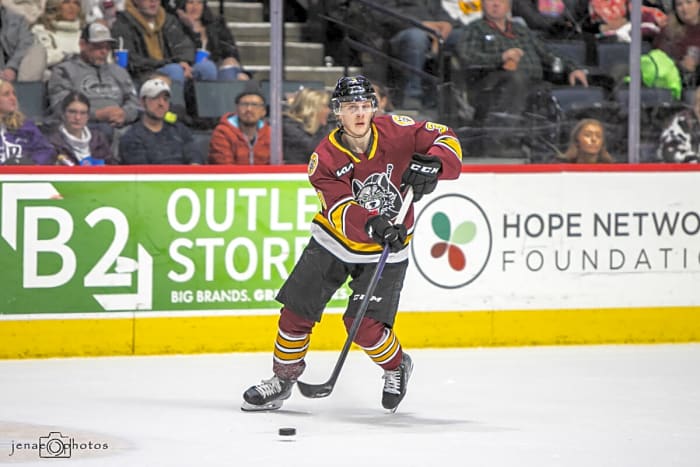
As far as his future, Honka signed a two-year extension with Ajoie back in December, which matched the writing on the wall for his Hurricanes future. The fact that he was loaned out for two consecutive seasons after his 70-game AHL rookie year back in 2022-23 spoke volumes to how the team felt about him internally, as well as his own view on progressing up the depth chart. As a third-round pick from the 2019 NHL Draft, he was always a bit of a boom-or-bust player due to his size, but it was a worthy gamble. Sometimes things just don’t work out. And while there’s no doubt Honka will have a great career overseas, this is surely the end of the road for his stay within the Hurricanes organization.
Verdict: Go.
Domenick Fensore
Domenick Fensore is a player who’s in a similar mold to Honka, but he’s a much more dynamic skater, which I believe puts him a notch above. That said, it’s hard to envision a 5-foot-9, 173-pound defender emerging as an NHL regular unless he’s extremely, extremely good at something — and in Fensore’s case, I’m not sure his ability as a skater qualifies. When he made his NHL debut this past season, the one thing I noticed was his lack of reach, which allowed opposing players to take the puck wide against him and into space. He also just doesn’t have the size to physically stop anyone that’s skating at him, which puts him in a tough position. Sure, he’s feisty, but I’m not convinced he will ever be able to consistently protect the crease.
All of that said, there’s no denying Fensore is an exciting and, more importantly, just a good player. His skating ability is mesmerizing. He can move the puck well, create offense, and actually played all situations for the Wolves this past season. I think as a raw talent, he’s good enough to play in the NHL, and his high-tempo style is a nice fit for how the Hurricanes play. But the size hampers him so much that I’m not sure he will ever break through consistently. Regardless, at age 23, he’s still worth developing, and at worst, he’s a key depth player who makes the Wolves a stronger hockey team.
Verdict: Qualified, re-signed for 1-2 years on a two-way deal.
Ronan Seeley
A seventh-round selection from the 2020 NHL Draft, it must be said that such a late selection developing into a reliable AHL defender is great drafting. Ronan Seeley has already established himself as exactly that, and could still improve if he can create offense more consistently. The Wolves mostly used him in a third-pair role this past season, but he was a key part of their penalty kill and has managed to stay healthy over his first three AHL seasons. Even if he doesn’t become an NHLer, he’s another good depth piece to have, and he’s far from a finished product at age 22. He’s an easy decision to re-sign and see if he can continue his progression.
Verdict: Qualified, re-signed for 1-2 years on a two-way deal.
Ty Smith
We wrap up the defensive category with Ty Smith, who came over in the Jake Guentzel trade last March. He initially served as the Hurricanes’ seventh defenseman, but was passed over throughout the season by Scott Morrow and Riley Stillman. He did manage 28 points in 36 games for the Wolves, but at this point, I don’t think the Hurricanes consider him a viable NHL option, and I wouldn’t want him taking ice-time away from a prospect in the minors. He can move the puck, but didn’t look good defensively in the NHL games that he played. For me, the Hurricanes would be better served to look for a more reliable 7/8 D option, and allow Smith the opportunity to try and catch on elsewhere.
Verdict: Go.
Goaltenders
Yaniv Perets
When the Hurricanes won the Yaniv Perets sweepstakes back in the spring of 2023, there was a lot of hype surrounding his future with the team. Fast forward two years, and his two NHL appearances are remarkably half of his AHL appearances — a grand total of four. Being passed over by 19-year-old Ruslan Khazheyev was pretty much the nail in the coffin for Perets, who never really graduated beyond the ECHL level during his two years in the organization.
Looking ahead, even with Spencer Martin and Dustin Tokarski heading out the door, it’s hard to find a reason for Perets to stay. Khazheyev will return in the Wolves’ crease this coming season, and the Hurricanes are likely to shop for a veteran goaltender or two to replace their departing ones. Historically, they like having a reliable third option on the depth chart, and Perets just isn’t that. Also, with Nikita Quapp coming over from Germany, he’ll likely step into the ECHL/depth role that Perets was currently occupying. For Perets, the best move for him would also be to look for a fresh start elsewhere and have a chance to prove himself at the AHL level. He seems like a great kid and has some talent, but there is no clear avenue to success for him in the Hurricanes’ organization.
Verdict: Go.
While the Hurricanes don’t really have any RFAs that are key to their current success, it’ll be important for them to make the right decisions on all of these guys. Injuries, lack of effectiveness above them and other contributing factors could lead to any of these kids getting a chance in the near future, and depth is pivotal for any contending team. I will also be writing the unrestricted free agent (UFA) version of this article in the coming days, so stay tuned for that as well!
More must-reads:
- NHL mock draft 2025: Projecting the first 10 picks
- NHL should shorten regular season, not extend it
- The 'Most goals in a Stanley Cup Playoffs' quiz
Breaking News
Trending News
Customize Your Newsletter
 +
+
Get the latest news and rumors, customized to your favorite sports and teams. Emailed daily. Always free!
